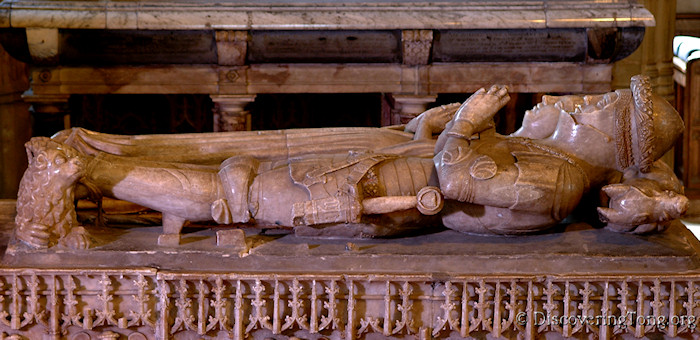Sir Richard Vernon (1391-1451)


Sir Richard, who inherited the Castle from his great uncle, Sir Fulke de Pembrugge, was bom in 1391 and was created a Knight in 1418. Sir Richard was a Member of Parliament and Speaker of the House of Commons when it met at Leicester in 1426. In 1444 he was appointed Treasurer of Calais, a post he resigned in favour of his son (Sir William Vernon) in 1450.
The tomb rests on a sandstone plinth and is ornamented with rich canopy work. On the sides of the tomb are twenty-three niches containing, alternately, twelve angels with shields and eleven apostles, identifiable by the symbols they hold. The figures are all formed and undercut from solid facings and traces of original paint can be seen on parts of the tomb. Sir Richard is clad in plate armour of the Lancastrian period and rests his head upon a helmet carrying the Vernon Crest - the Boar’s Head. Around his head is a large circlet of gilt laurel leaves and probably pearls. There is a gold circlet around the forehead and a stud over the ears to fasten the body armour to the basinet. He wears a sword belt, a sword and the SS collar ➚. At his feet is a lion. The SS collar, composed of links of silver letter ‘S’s to stand for ‘Soverayne’ was given as a mark of distinction has with badges at the centre containing the shamrock, rose and thistle, was introduced by Henry IV.
Alongside him is Benedicta de Ludlow the daughter of the church’s founder Isabel de Pembrugge (by a previous marriage). She, wears the SS collar and a mitred head-dress. There is no inscription on the tomb, but in a Gothic window in the Chapel at Haddon Hall there is an inscription asking for prayers for Sir Richard and his wife Benedicta. His son, Sir William Vernon whose tomb is located to the west inherited the estate from Sir Richard.